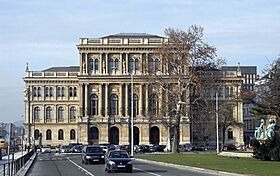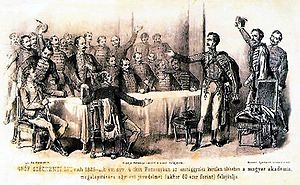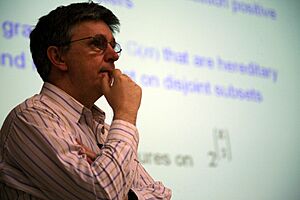Hungarian Academy of Sciences facts for kids
|
Magyar Tudományos Akadémia
|
|

The seat of the academy on the bank of the Danube in Budapest
|
|
| Abbreviation | MTA |
|---|---|
| Formation | 3 November 1825 |
| Type | National academy |
| Headquarters | Budapest, Hungary |
| Location |
|
|
Region served
|
Hungary |
|
Membership (2014)
|
1,363 |
|
President
|
Tamás Freund |
|
Formerly called
|
Magyar Tudós Társaság |
The Hungarian Academy of Sciences (also known as MTA) is a very important group in Hungary that helps science grow. It is the top learned society in the country. Its main building is in Budapest, right by the Danube River. The Academy works to make scientific knowledge better and shares new discoveries. It also supports new research and helps represent science in Hungary to the rest of the world.
Contents
History of the Academy
The Hungarian Academy of Sciences started a long time ago, in 1825. A man named Count István Széchenyi offered money to create a "Learned Society." He did this during a meeting of the Diet in Pressburg (which is now Bratislava). Other important people were inspired by him and also gave money.
The main goal of this new society was to help the Hungarian language grow. It also aimed to support science and art in Hungarian. In 1845, the group officially became the Hungarian Academy of Sciences. Its beautiful main building, designed by Friedrich August Stüler, opened in 1865.
How the Academy Works: Sections

Inside the Academy, there are different groups called scientific sections. Each section focuses on a specific area of science. They watch over, help, and check scientific work in their field. These sections also give expert advice on science topics and how research should be organized. They even help decide who gets the Doctor of the Hungarian Academy of Sciences degree, which is a very high academic award in Hungary.
Today, the Academy has eleven main scientific sections:
- Linguistics and Literary Scholarship (studying languages and books)
- Philosophy and Historical Sciences (thinking about big ideas and history)
- Mathematics (numbers and patterns)
- Agricultural Sciences (farming and food)
- Medical Sciences (health and medicine)
- Engineering Sciences (designing and building things)
- Chemical Sciences (how things are made and react)
- Biological Sciences (living things)
- Economics and Law (money, trade, and rules)
- Earth Sciences (our planet)
- Physical Sciences (energy and matter)
Past Research Institutes (until 2019)
Until 2019, the Hungarian Academy of Sciences had many research centers. These centers focused on different areas of science. They helped scientists do important work and make new discoveries. Some of these institutes included:
- MTA Agricultural Research Centre
- MTA Chemical Research Center
- MTA Research Centre for Astronomy and Earth Sciences
- MTA Szeged Research Centre for Biology
- MTA Centre for Ecological Research
- MTA Research Centre for Economic and Regional Studies
- MTA Centre for Energy Research
- MTA Research Centre for the Humanities
- MTA Research Institute for Linguistics
- MTA Rényi Institute of Mathematics
- MTA Institute of Experimental Medicine
- MTA Research Centre for Natural Sciences
- MTA Institute of Nuclear Research
- MTA Wigner Research Centre for Physics
- MTA Centre for Social Sciences
Leaders of the Academy: Presidents
The Hungarian Academy of Sciences has had many presidents over the years. The president is the main leader of the Academy. Here is a list of the people who have served as president:
| Count József Teleki | 17 November 1830 – 15 February 1855 |
| Count Emil Dessewffy | 17 April 1855 – 10 January 1866 |
| Baron József Eötvös | 18 March 1866 – 2 February 1871 |
| Baron Menyhért Lónyay | 17 May 1871 – 3 November 1884 |
| Dr. Ágoston Trefort | 28 May 1885 – 22 August 1888 |
| Baron Loránd Eötvös | 3 May 1889 – 5 October 1905 |
| Albert Berzeviczy | 27 November 1905 – 22 March 1936 |
| Archduke Joseph Habsburg | 22 March 1936 – October 1944 |
| Gyula Kornis | 7 March 1945 – 29 October 1945 |
| Gyula Moór | 29 October 1945 – 24 July 1946 |
| Zoltán Kodály | 24 July 1946 – 29 November 1949 |
| István Rusznyák | 29 November 1949 – 5 February 1970 |
| Tibor Erdey-Grúz | 5 February 1970 – 16 August 1976 |
| János Szentágothai | 26 October 1976 – 10 May 1985 |
| Iván T. Berend | 10 May 1985 – 24 May 1990 |
| Domokos Kosáry | 24 May 1990 – 9 May 1996 |
| Ferenc Glatz | 9 May 1996 – 4 May 2002 |
| Szilveszter Vizi | 5 May 2002 – 6 May 2008 |
| József Pálinkás | 6 May 2008 – 5 May 2014 |
| László Lovász | 6 May 2014 – 31 July 2020 |
| Tamás Freund | 1 August 2020 – present |
Széchenyi Academy of Literature and Arts
The Széchenyi Academy of Literature and Arts is a group connected to the MTA. It was started in 1992. This academy focuses on literature and arts. Some famous members have included writers like György Konrád and Magda Szabó, the pianist Zoltán Kocsis, and film directors like Miklós Jancsó and István Szabó.
See also
 In Spanish: Academia Húngara de Ciencias para niños
In Spanish: Academia Húngara de Ciencias para niños
- Open access in Hungary
- HUN-REN Wigner Research Centre for Physics
 | James Van Der Zee |
 | Alma Thomas |
 | Ellis Wilson |
 | Margaret Taylor-Burroughs |


